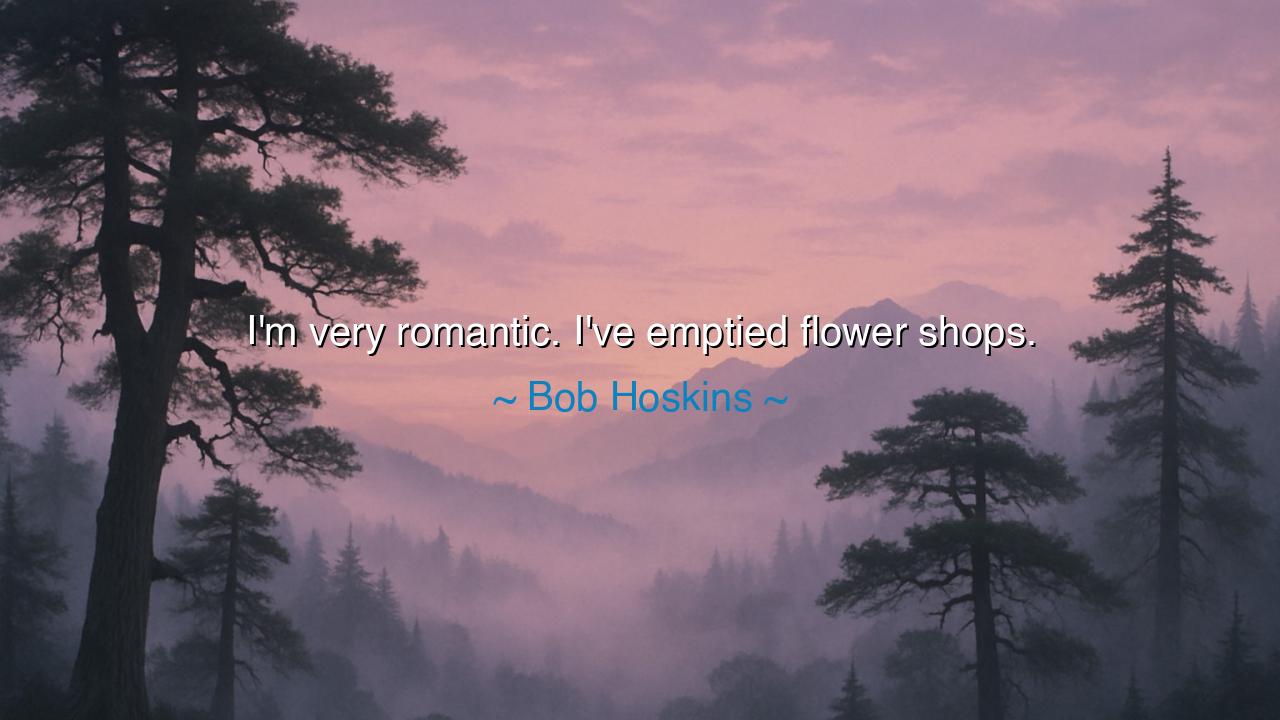
I'm very romantic. I've emptied flower shops.






The words of Bob Hoskins come forth with bold simplicity and disarming honesty: “I’m very romantic. I’ve emptied flower shops.” In this declaration, he reveals a truth that stretches beyond mere humor—the unashamed act of giving, the abundance of gesture, the willingness to pour out visible symbols of affection until none are left to purchase. Here, romance is not measured in moderation, but in extravagance of devotion, in gestures so lavish that they overwhelm the beloved with their sheer force of feeling.
The ancients too would have understood this impulse. In their myths, lovers did not love with half a heart; they offered kingdoms, waged wars, built monuments, and wrote epics to proclaim their passion. The act of emptying a flower shop is but the modern echo of these grand gestures—no less symbolic, no less filled with fire. To give flowers, countless and overflowing, is to cry out: “My love is not small, my love is not rationed—it is as abundant as spring itself, as relentless as nature’s bloom.”
Flowers themselves carry deep symbolism. They are fragile, fleeting, destined to wither, and yet they embody beauty at its height. To shower a beloved with flowers is to say, “I give you the best of what is brief, so that you may hold beauty in your hands.” In Hoskins’ phrase, to empty the flower shop is to exhaust every token of beauty, to lay all offerings at the feet of love, to hold nothing back. It is a confession that romance, to him, is not measured in subtle restraint but in open-handed abundance.
History gives us many examples of such overwhelming acts of devotion. Consider Richard Wagner’s patron, King Ludwig II of Bavaria, who poured his wealth into building grand operatic halls and castles for the sake of beauty and art. Though extravagant, these acts were born of the same spirit: the conviction that love and beauty deserve to be celebrated on a scale that leaves no doubt. Like Hoskins, Ludwig gave not a handful of flowers, but the whole garden, the whole treasury, as testimony of passion.
Yet there is humility hidden in Hoskins’ words. For the man who says “I’ve emptied flower shops” admits also that he has been overcome by love, that reason gave way to feeling. The world may laugh, call it excessive, but the ancients would call it noble. For better to be remembered as the one who gave too much than as the one who gave too little. Better to flood the house with roses than to let love pass by, barren and unspoken. The hopeless romantic is also the bravest, for he risks ridicule in order to honor love.
The lesson is clear: do not hold back in your devotion. If you love, show it—not in half-measures, but in ways that leave no doubt. You may not empty flower shops, but you can empty your time, your attention, your words, your deeds, for the sake of the beloved. Romance is not about the flowers themselves, but about the heart willing to give abundantly, even foolishly, because it knows that love deserves no less than everything.
Therefore, let all who hear take action: be bold in your gestures of love. Write the letter, buy the flowers, speak the words, plan the feast. Do not wait for the perfect moment or fear the charge of extravagance. For love is fleeting, as flowers are fleeting, and its beauty must be celebrated while it blooms. In the end, you will not regret the gifts you gave too freely—you will regret only the ones you withheld.
Thus the words of Bob Hoskins endure as both playful confession and timeless wisdom: “I’m very romantic. I’ve emptied flower shops.” May we too live with such daring, so that our loves are not remembered as whispers, but as songs—loud, abundant, overflowing, like armfuls of blossoms carried through the streets.






AAdministratorAdministrator
Welcome, honored guests. Please leave a comment, we will respond soon